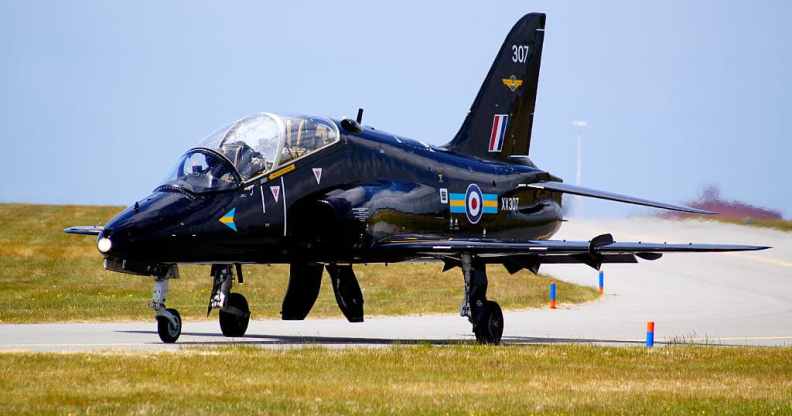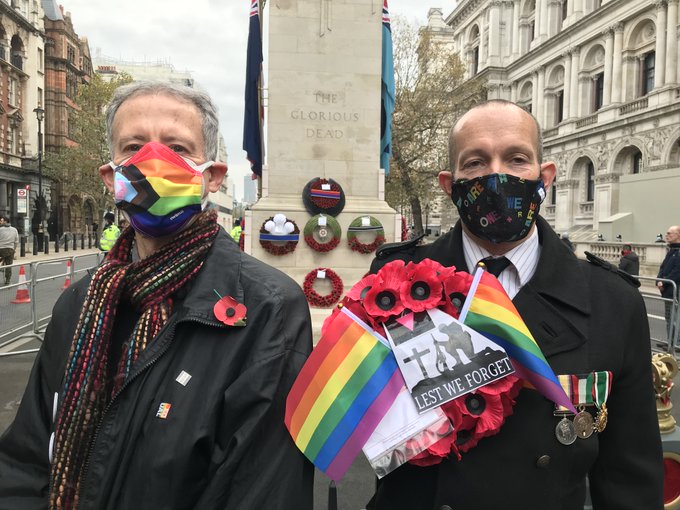RAF accused of ‘torturing’ serviceman for days after finding out he was gay

An RAF Hawk jet. (Getty)
A former RAF serviceman says he was “tortured for being gay” by the force in the 1980s.
Simon Hinchley-Robson joined the RAF in 1980. Six years later he was working as a cook at RAF Bawdy in Pembrokeshire when he fell ill.
After being diagnosed with glandular fever and feeling concerned by sudden weight loss, he requested an HIV test.
The RAF took this as confirmation Hinchley-Robinson was gay – until 2000, queer people were banned from serving in the armed forces.
He was arrested after his discharge from a civilian hospital by RAF police and what followed, according to a testimony read by his local MP, Clive Efford, in parliament last week, was “the most horrendous and awful experience no-one should ever have to endure”.
Hinchley-Robson said he was left in an interrogation room for four days and suffered “a form of torture for being gay”.
“I was denied food, I was denied sleep and only given small amounts of water. I was immediately searched, asked to strip and searched internally,” Efford read out, according to ITV. “They said this was the procedure.”
Hinchley-Robson claims he was asked to name any other serviceperson he’d had a relationship with.
When he refused, “the medical gloves went on and I was again subject to what I can only say was rape while I was again internally searched,” he wrote.
With every four hours came a change of shift for those interrogating him, which also meant a new search.
Ultimately, Hinchley-Robson was discharged. He was 21 at the time and lost out on his Armed Forces pension.
The government responded to Efford reading out Hinchley-Robinson’s testimony, inviting him to apply to have the pension reinstated.
It also claimed that the Armed Forces of today are a more welcoming place.
Efford told ITV that he was “struck by the response from the government”, and that it had a “tone of understanding and contrition” which had been lacking from their communications until then.
He also “urged” those in similar positions who had seen the debate to come forward about their experiences too.
Hinchley-Robson told the broadcaster that he had hoped for the government to “come forward and say they were wrong”.
“All I wanted was my pension reinstated,” he continued. “That was it. I wasn’t after major money or anything like that.
“There are so many people who will have gone through exactly the same. There are at least four people that I know, from Gibraltar to back in the UK, who went through a similar thing and unfortunately they hanged themselves. And I want justice for them as well.”
He added: “Although they say you can be open in the forces, I would still dispute, if I walked into an army recruitment office or the marines and said ‘by the way I am gay, I want to join up’, they would find everything they could to stop me from joining up. They really would.”
Hinchley-Robson isn’t the only former RAF serviceman who has come forward about homophobia during their time serving. RAF veteran, David Bonney, was jailed in 1993 for having a “brief affair” with another man.

Peter Tatchell and David Bonney laid a rainbow poppy wreath at the Cenotaph. (Peter Tatchell/Twitter)
Until a ban was lifted in January 2000, anyone in the military who was found to be homosexual was dishonourably discharged and could be jailed for up to six months. Bonney was one of the last servicemen in the British military to be sent to prison for his sexuality under this law.
He claimed that “operations” to catch gay service members in the RAF were common at the time, saying: “The money that they spent on trying to get rid of us, spy on us, prosecute us, was ridiculous.”
Much like Hinchley-Robson, Bonney has stated that measures to expand inclusivity are insufficient and is hoping for an official apology.
In February 2021, the government announced plans to return medals to veterans who were stripped of them on the basis of being gay or trans.
In December, it announced the overturning of a ban which meant people living with HIV lost their classification as “fully fit”, preventing them from deployment to some operations.
Today is #WorldAIDSDay. Below is Allen, one of our MGS Guards.
Today the MOD have announced some that people serving in our armed forces will no longer be seen as unfit to serve and will be given the supportive assistance to live a fully fit and successful career in Defence. pic.twitter.com/UTrXxTRNSA
— MOD LGBTQ+ Network (@MODLGBT) December 1, 2021
Similarly, 2017’s Turing’s Law was passed with the intention of pardoning gay men who had faced certain criminal convictions on the basis of their sexuality. The law was named after Alan Turing, the World War II codebreaker and forerunner of computing who was convinced for his homosexuality in 1952.
However, only 189 living people have benefited from the law, according to a 2019 BBC article. In January 2022, the scheme was widened to cover any repealed or abolished civilian or military offence imposed on someone purely for, or due to, consensual homosexual activity.
A Ministry of Defence spokesperson also told ITV: “We are proud of LGBT+ service personnel and value their current and historic contributions to our Armed Forces.
“It will always remain deeply regrettable that personnel were historically discriminated against because of their sexuality, it was unacceptable then and it is unacceptable now. We do not tolerate any form of bullying, harassment and discrimination within defence.
“We take the wellbeing of all those who have served extremely seriously and have a range of support mechanisms in place for our veterans.”
The Ministry of Defence did not immediately respond to a request from PinkNews for comment.
Rape Crisis England and Wales works towards the elimination of sexual violence. If you’ve been affected by the issues raised in this story, you can access more information on their website or by calling the National Rape Crisis Helpline on 0808 802 9999. Rape Crisis Scotland’s helpline number is 08088 01 03 02.
Readers in the US are encouraged to contact RAINN, or the National Sexual Assault Hotline on 800-656-4673.

